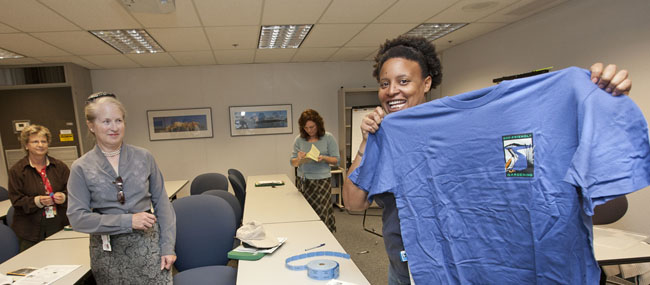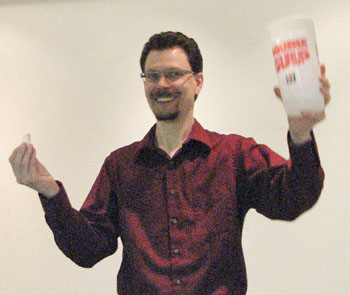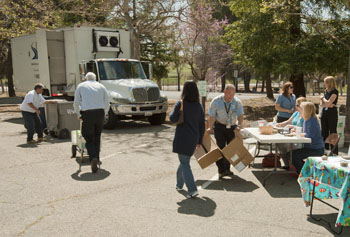How to prevent global warming while getting more cool drink for your money
If you want to be environmentally responsible and cool, cut back on the ice cubes you put in your drink. That was the message from climate scientist and Toastmaster Philip Cameron-Smith in an Earth Week talk entitled "A longer, cool drink."
"Cool drinks are wonderful on a hot day summer day, so ice cubes are great," Cameron-Smith said, explaining that "ice cubes work because the energy absorbed by melting ice is large - 80 times as much as cooling the same amount of drink by one degree C.
"However, any ice cubes left in the glass after the drink has been drunk are wasted," he said.
A well traveled New Zealand native, Cameron-Smith says foreign visitors are often amazed by America's love affair with ice and the quantities of ice cubes used with all manner of beverages, especially soft drinks sold in fast food restaurants.
Considerable energy is required to "extract" heat from water and produce ice cubes, he points out. "That energy costs money. The production of the energy to make the ice cube also has an environmental impact, most commonly carbon dioxide emissions in California."
In addition to energy and environmental consequence, there are economic issues. "The ice cubes take up space that could have been used for the drink," Cameron-Smith said, waving a 'Big Gulp' full of ice. "A full cup of ice cubes will only be half a cup of drink, so stores fill up your cup with ice to save money -- at your expense."
Another issue with the production of ice cubes at home is that they often absorb unpleasant odors and tastes from other items in the refrigerator, he said. "There's nothing worse than tasting that fish that's been in your freezer too long in your favorite cocktail."
The solution is simple, Cameron-Smith says: "Reduce your ice to the minimum, and you will get a longer, better tasting, healthier, cheaper, and more environmentally friendly, cool drink."
The talk by the veteran Toastmaster was an Earth Week event sponsored by the Microcentury Toastmasters (MCTM) LLESA activity group. Charles Reid of Engineering, a new member of MCTM, also spoke, delivering a talk on the importance of individual responsibility in the collective effort to steward environmental resources.
*The Laboratory celebrated the 42nd anniversary of Earth Day this week with other activities ranging from a recycled craft workshop to park trail stewardship to presentations by guest speakers. On Monday, employees had the opportunity to make gift boxes out of greeting cards. That same day, the Lab's Craig Fish discussed some of the recent trail maintenance activities along with some wilderness photos. The LLESA Park Trail Stewardship networking group serves as a resource for employees interested in volunteering to help restore and preserve access to parks in the greater Bay area.
In addition to learning about Bay Friendly Landscaping and sustainable landscaping, a visit by Terra Bella Farms and a talk by Rich Sweitzer discussing his experiences with the Pacific Fisher, employees also had the opportunity to shred their personal documents for a nominal fee as well as hear about the teams that won this year's Environmental Awards.







